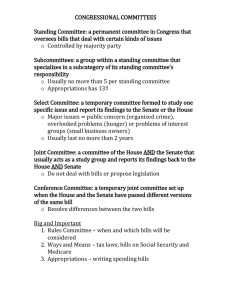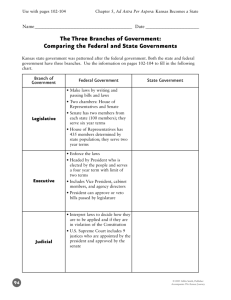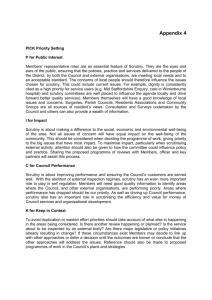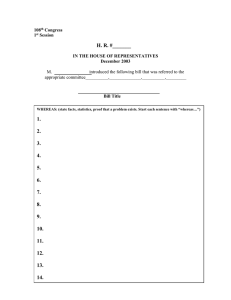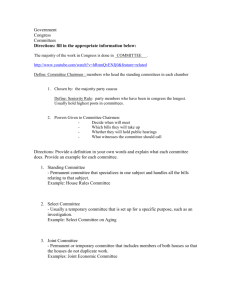Castan Centre for Human Rights Law Monash University Melbourne
advertisement
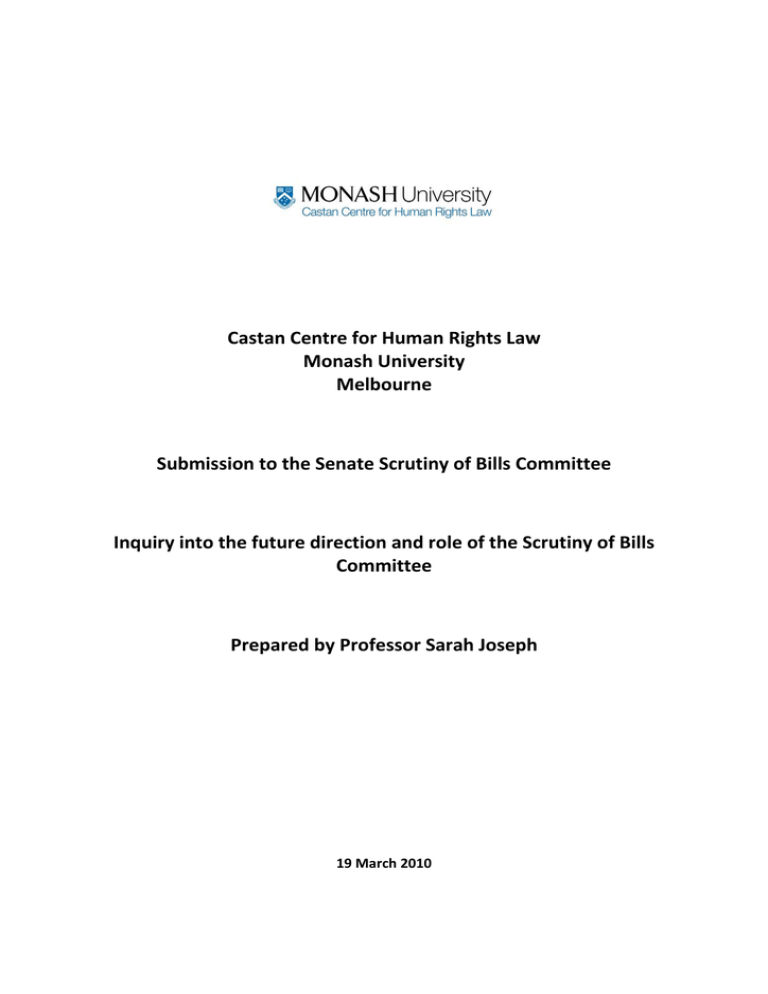
Castan Centre for Human Rights Law Monash University Melbourne Submission to the Senate Scrutiny of Bills Committee Inquiry into the future direction and role of the Scrutiny of Bills Committee Prepared by Professor Sarah Joseph 19 March 2010 Castan Centre Submission – Inquiry into the future direction and role of the Scrutiny of Bills Committee 2 This submission is focused on the role the Committee, or a new Committee, should have in regard to scrutinizing legislation for compliance with human rights. 1. In the report of the National Human Rights Consultation, it was recommended that a Joint Committee on Human Rights be established to review all Bills and regulations for human rights compliance. 1 The UN Human Rights Committee, in its review of Australia, also recommended that a mechanism be established to “ensure the compatibility of domestic law with the” International Covenant on Civil and Political Rights. 2 We respectfully agree with these recommendations. 2. Australia is a party to numerous international human rights treaties, and is bound in international law to give effect to the provisions in those treaties. The current terms of reference for the Scrutiny of Bills Committee do not specify that the Committee reports on compliance with all of those obligations. Instead, they are focused on ill‐ defined “personal rights and liberties”. With respect, this power seems rooted in the old‐fashioned (and often misguided) 3 notion of common law rights. The powers of the current Committee do not reflect human rights as commonly understood in the late twentieth century, let alone the twenty‐first. For example, scrutiny is focused only on civil and political rights, despite Australia’s numerous international obligations regarding economic social and cultural rights. 3. The responsibilities of the current Senate Scrutiny of Bills Committee with regard to personal rights and liberties 4 should be transferred to a Joint Committee on Human Rights. The new Committee should review all bills and subordinate legislation with regard to their impact on all of Australia’s human rights obligations. It should also monitor Australia’s compliance with relevant international decisions and recommendations, such as findings by UN treaty bodies of violation by Australia under individual complaints procedures, 5 follow‐up on the concluding observations issued by treaty bodies pursuant to Australia’s periodic reports to those committees, recommendations to Australia by UN human rights special rapporteurs, 6 as well as 1 Report of the National Human Rights Consultation Committee, Recommendation 7. Human Rights Committee, Concluding Observations on Australia, UN doc. CCPR/C/AUS/CO/5, 7 May 2009, para 8. 3 See Submission of the Castan Centre to the National Human Rights Consultation, http://www.law.monash.edu.au/castancentre/publications/bill-of-rights.pdf, paras 2.9-2.12. 4 These are the responsibilities listed at (i) to (iii) at http://www.aph.gov.au/Senate/Committee/scrutiny/cominfo.htm. 5 See Human Rights Committee, Concluding Observations on Australia, UN doc. CCPR/C/AUS/CO/5, para 10. 6 See, eg, Report of the UN Special Rapporteur on Rights of Indigenous Peoples, James Anaya, on his visit in 2009 to Australia, UN doc. HRC/15, 4 March 2010, at http://www2.ohchr.org/english/issues/indigenous/rapporteur/docs/ReportVisitAustralia.pdf. 2 2 Castan Centre Submission – Inquiry into the future direction and role of the Scrutiny of Bills Committee 4. 5. 6. 7. 8. 3 recommendations which will arise from the Universal Periodic Review of Australia in 2011. 7 The Committee should also scrutinize government responses to reports of the Australian Human Rights Commission. The Joint Human Rights Committee should also undertake an appropriate role under any new federal human rights legislation which may arise as a result of the National Human Rights Consultation, such as reporting on government responses to Declarations of Incompatibility, and commenting on executive Statements of Compatibility. The Joint Human Rights Committee should meet regularly, at least once per week during parliamentary sessions. It should also regularly seek the views of Parliament, and other interested parties to its inquiries (such as the Australian Human Rights Commission). It should table its findings in Parliament. The Government, in turn, should be expected to make substantive responses to the findings of the Committee, which should also be tabled in Parliament. Failures to respond should be brought to Parliament’s attention. The Joint Human Rights Committee should conduct inquiries as directed by either House of Parliament, and also of its own motion. The latter power should be added to the current Committee, regardless of whether a new Committee is created. The Senate Scrutiny of Bills Committee should retain its power to scrutinize Bills with respect to inappropriate delegations and insufficient subjection of legislative power to Parliamentary scrutiny. 8 The Committee should be much more robust in discharging its obligations than the current Scrutiny of Bills Committee. This recommendation applies regardless of whether the Government moves forward with the creation of a Joint Committee on Human Rights. It is submitted that the current Committee is too deferential in the discharge of its duties. For example, its “action” options consist of “no further comment”, letting the Senate decide if rights and liberties have been trespassed “unduly”, and seeking information from the relevant Minister. After the Minister’s response is received, the Committee can then advise whether it considers the legislation or legislative instrument to “unduly” trespass on rights and liberties. The Committee should be braver in making such decisions, rather than deferring to the 7 Universal Periodic Review is a process whereby Australia’s human rights record will be assessed by its peers in the United Nations under the auspices of the UN Human Rights Council. 8 These are listed as responsibilities (iv) and (v) at http://www.aph.gov.au/Senate/Committee/scrutiny/cominfo.htm. 3 Castan Centre Submission – Inquiry into the future direction and role of the Scrutiny of Bills Committee 4 whole of the Senate on most occasions, if it takes action at all. Ministers commonly fail to respond when requested to do so. Such a failure should be highlighted and censured by the Committee, with the censure tabled in Parliament, as it reflects disrespect for the parliamentary process. 9. Committee reports 9 must be rigorous and well referenced. In contrast, I note certain reports emanating from the current Committee regarding anti‐terrorism legislation. It seems on numerous occasions the Committee simply accepted, without much explanation, the explanation that security concerns dictated against a more rights‐complaint outcome. It is true that security concerns can sometimes justify a limitation to human rights. But, in such instances, the Committee should explain why it has come to such conclusions, rather than issue pat conclusory statements. 10. For instance, in response to the sections 105.15 and 105.16 of the Anti‐Terrorism Bill (no. 2) 2005 (Cth), the Committee noted its concern about prohibited contact orders, which prohibit a person subject to a detention order from contacting specified persons. The Committee noted in its digest simply that it was concerned that the “contact order makes rights or liberties dependent on non‐reviewable decisions,” yet left “for the Senate as a whole the question of whether it does so unduly.” 10 Not only did the Committee fail to request further information from the relevant Minister, it seemed to ignore the fact that such an order in and of itself limits fundamental human rights: it only questioned the fact that such orders were non‐ reviewable. Additionally the Committee did not appear to consider that section in conjunction with other provisions that further limited the human rights of a person subject to a preventative detention order, including the lack of a requirement to notify the detained person of the existence of the prohibited contact order, 11 the limits to the contact allowed with a lawyer, 12 and the limits to contact with a family member. 13 Indeed, there was no significant scrutiny of the necessity or justification for the introduction of preventative detention per se. While preventative detention regimes can on occasion comply with human rights norms, such compliance can hardly be presumed without significant consideration of the issue. 9 Again, this recommendation applies to the current Committee and any new Joint Human Rights Committee that might be created. 10 Commonwealth Senate Scrutiny of Bills Committee, “Alert Digest No. 13 of 2005”, 9 November 2005, p 12. 11 Anti-Terrorism Bill (no. 2) 2005 (Cth), 105.28(3). 12 Ibid, ss 105.37(1)(a), 105.38 and 105.32(6-9). 13 Ibid s 105.35. 4 Castan Centre Submission – Inquiry into the future direction and role of the Scrutiny of Bills Committee 5 11. A further example of the need for the Committee to be more robust in discharging its obligations arose in the Committee’s review of the Northern Territory National Emergency Response Act 2007 (Cth). Subclause 4(2) of the act removed the operation of Part II of the Racial Discrimination Act 1975 (RDA). The Committee did note the justification of the suspension of the RDA put forward by the Government, but then concluded that the “provisions may be considered to trespass on personal rights and liberties”. 14 Sadly, however, the Committee then left it “for the Senate as a whole the question of whether they do so unduly.” 15 Consequently, the Minister was not required to address this blatant departure from Australia’s international and domestic human rights obligations in his response to the Committee’s comments. In this situation, the review of the Act proved weak in addressing human rights issues. 12. The Committee must be well resourced in order to carry on the functions described above, and to do so in a timely and rigorous fashion. Support staff for a Joint Committee on Human Rights should for example have human rights expertise, or at the very least, have received human rights training. 14 Commonwealth Senate Scrutiny of Bills Committee, “Alert Digest No. 9 of 2007, 13 August 2007, p 11. 15 Ibid. 5
